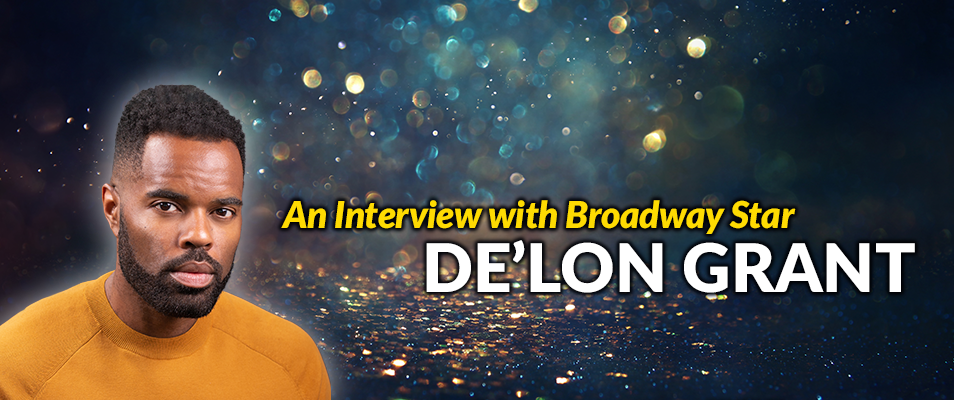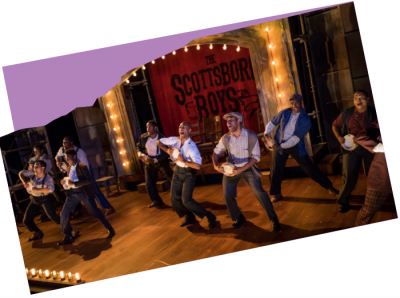Your donation sets the stage for a new season of Boston's most intimate, entertaining and provocative plays and musicals. Our shows make powerful connections with our audiences-- and they are only possible because of you.
Calendar
Search
An Interview with Broadway Star De’Lon Grant


An Interview with Broadway Star De’Lon Grant
Four years ago, during lead-up to the 2016 election, De’Lon Grant starred as Haywood Patterson in SpeakEasy’s mega-hit production of The Scottsboro Boys, which sold out both its original run and its remount in January 2017. Six months later, De’Lon made his Broadway debut in Come From Away, the musical that has been stealing hearts for the past three years with its infectious lyrics and heartwarming message of how humans can come together in the most difficult of times. Now he’s back at SpeakEasy (virtually, anyway) to host our 30th Anniversary Fall Benefit: Celebrating 30 Years of Groundbreaking Theatre on November 19th, so we thought we’d catch up with the Broadway star on what he’s been up to these past four years.
It was just around this same time four years ago – amidst the insanity of the 2016 election — that the SpeakEasy production of The Scottsboro Boys opened in Boston. What do you remember most about that time and the production?
I guess the clearest memory is a renewed depth around the importance of telling stories like that of The Scottsboro Boys. The rhetoric that was amplified in the election by the current president, while perhaps coded in dog whistles, was and is the language, sentiment, and ideology that allowed the nine Scottsboro Boys to be falsely accused and spend most of their lives in prison. To be honest, there was also acute sadness during that time. As our company of The Scottsboro Boys sat in the one swampiest eras of America’s history, it broke my heart to see, in real time, how easily our country could return to the muck.
I guess the clearest memory is a renewed depth around the importance of telling stories like that of The Scottsboro Boys. The rhetoric that was amplified in the election by the current president, while perhaps coded in dog whistles, was and is the language, sentiment, and ideology that allowed the nine Scottsboro Boys to be falsely accused and spend most of their lives in prison. To be honest, there was also acute sadness during that time. As our company of The Scottsboro Boys sat in the one swampiest eras of America’s history, it broke my heart to see, in real time, how easily our country could return to the muck.
Remind folks who might not be familiar with the history what The Scottsboro Boys is all about.
Unfortunately, it’s not unlike many stories that afflicted black men in America at the time. In 1931, two white women, attempting to divert attention away from their own salacious crimes, falsely accused nine black boys, aged 13-19, of rape. What ensued was one of the first national spotlights on the inequities of the American justice system. The nine boys spent most of their lives incarcerated, barely surviving white lynch mobs and all-white juries.
Unfortunately, it’s not unlike many stories that afflicted black men in America at the time. In 1931, two white women, attempting to divert attention away from their own salacious crimes, falsely accused nine black boys, aged 13-19, of rape. What ensued was one of the first national spotlights on the inequities of the American justice system. The nine boys spent most of their lives incarcerated, barely surviving white lynch mobs and all-white juries.
What was it like for you to retell such a traumatic story every night? How did you unwind after a performance?
We had an amazing company of artists working on that production. There was so much laughter and love that happened offstage and outside of the theatre; and that provided a buffer for us, I think. I know it lifted me up. Also, Boston. The community embraced us and the story so much and so deeply. Their love and spirit also filled my cup back up after each performance.
We had an amazing company of artists working on that production. There was so much laughter and love that happened offstage and outside of the theatre; and that provided a buffer for us, I think. I know it lifted me up. Also, Boston. The community embraced us and the story so much and so deeply. Their love and spirit also filled my cup back up after each performance.
SpeakEasy’s Fall 2016 production of The Scottsboro Boys was so popular that the company brought it back for an additional four-week run in January of 2017. Why do you think the show was such a success? What was your major take-away from the experience?
I can’t be sure why it was such a success exactly, but my guess is that a lot of people didn’t know the story. I think that, as a country having twice elected a black president, there was a sense that we were passed such events, meaning we could look back at The Scottsboro Boys’ story with unobjective horror and feel more comfortable about how we’ve progressed as a country. I would be remiss if I didn’t also mention how well written and constructed the show is. Lastly, and I’m biased here, our company across the board: the creative, cast, and production teams — were kismet.
I can’t be sure why it was such a success exactly, but my guess is that a lot of people didn’t know the story. I think that, as a country having twice elected a black president, there was a sense that we were passed such events, meaning we could look back at The Scottsboro Boys’ story with unobjective horror and feel more comfortable about how we’ve progressed as a country. I would be remiss if I didn’t also mention how well written and constructed the show is. Lastly, and I’m biased here, our company across the board: the creative, cast, and production teams — were kismet.
Following the success of The Scottsboro Boys, you headed to NYC and soon thereafter made your Broadway debut in the hit musical Come From Away. What do you remember most about the night of your Broadway debut?
I was in disbelief my opening night on Broadway in Come From Away. The entire experience leading up to that first performance was such a whirlwind that it was hard to digest in the moment. Once the show was over, the entire company surrounded me in a group hug and I was a crying, blubbering mess. My debut was also the day before my 34th birthday, so that also kind of makes it unforgettable.
Tell us about Come From Away and the role you play.
Come From Away is the story of how, post 9/11, 7000 stranded airline passengers were taken in by a small town in Newfoundland Canada. For five days, these Newfoundlanders fed, clothed, provided medication, and threw birthday parties for Make-A-Wish kids without hesitation. It’s a reminder to us all of our innate kindness as human beings, and how we’re all in this life together. I play several characters in the show, but my main character is a guy named Bob. He is a cautious New Yorker who is wary of all of the kindness and generosity coming from the Canadian Newfoundlanders.
Come From Away is the story of how, post 9/11, 7000 stranded airline passengers were taken in by a small town in Newfoundland Canada. For five days, these Newfoundlanders fed, clothed, provided medication, and threw birthday parties for Make-A-Wish kids without hesitation. It’s a reminder to us all of our innate kindness as human beings, and how we’re all in this life together. I play several characters in the show, but my main character is a guy named Bob. He is a cautious New Yorker who is wary of all of the kindness and generosity coming from the Canadian Newfoundlanders.
You have been with the company of Come From Away since Aug 4, 2017. What’s it been like to have such a long run in one show? How do you keep your performance fresh?
It’s been such a gift to be a part of telling this story. I can’t wait to get back to it. Come From Away employs a lot of direct address to the audience to tell the story. We refer to our audiences as our 13th cast member. That keeps our performances fresh for sure.
It’s been such a gift to be a part of telling this story. I can’t wait to get back to it. Come From Away employs a lot of direct address to the audience to tell the story. We refer to our audiences as our 13th cast member. That keeps our performances fresh for sure.
So you will be returning to Come From Away when Broadway re-opens?
Yes, yes, and yes! I’m biased, but I think Come From Away is a story we’re gonna need post-pandemic. We could all use more kindness and love. I want to help continue to disseminate that.
Yes, yes, and yes! I’m biased, but I think Come From Away is a story we’re gonna need post-pandemic. We could all use more kindness and love. I want to help continue to disseminate that.

How have you been spending your time during quarantine?
I’m trying to stay creative. I’ve been trying to do some writing, have been taking guitar lessons, and doing a few other creative classes here and there. I also got a dog, which has been a lovely journey. I live alone, so the companionship in quarantine has been invaluable.
I’m trying to stay creative. I’ve been trying to do some writing, have been taking guitar lessons, and doing a few other creative classes here and there. I also got a dog, which has been a lovely journey. I live alone, so the companionship in quarantine has been invaluable.
What are your thoughts/response to the current movement in the theater industry calling out racism and inequities?
What can I say? I think it’s important. It’s time. I just hope that putting a spotlight on the inequities can create a movement for change.
What can I say? I think it’s important. It’s time. I just hope that putting a spotlight on the inequities can create a movement for change.
What one change would you most like to see in the industry when the theater industry is able to resume performances?
I would love there to see more BIPOC people, women in particular, as decision makers. We often talk about the need for diversity and inclusion in our industry, which usually manifests on the micro level, such as choosing diverse stories to put onstagen casting more actors of color. I wonder what the industry would be like if we had more BIPOC women as gatekeepers, serving as artistic directors, executive directors, casting directors, producers, board members, and more.
I would love there to see more BIPOC people, women in particular, as decision makers. We often talk about the need for diversity and inclusion in our industry, which usually manifests on the micro level, such as choosing diverse stories to put onstagen casting more actors of color. I wonder what the industry would be like if we had more BIPOC women as gatekeepers, serving as artistic directors, executive directors, casting directors, producers, board members, and more.
To purchase tickets to our 30th Anniversary Virtual Benefit Concert and see De’Lon and dozens of other SpeakEasy favorites perform, click here!
Because of You
SpeakEasy Signups
Sign up to get the latest updates on all our shows, readings, workshops and programs.
 Past Productions
Past Productions The Antiquities
The Antiquities Swept Away
Swept Away




